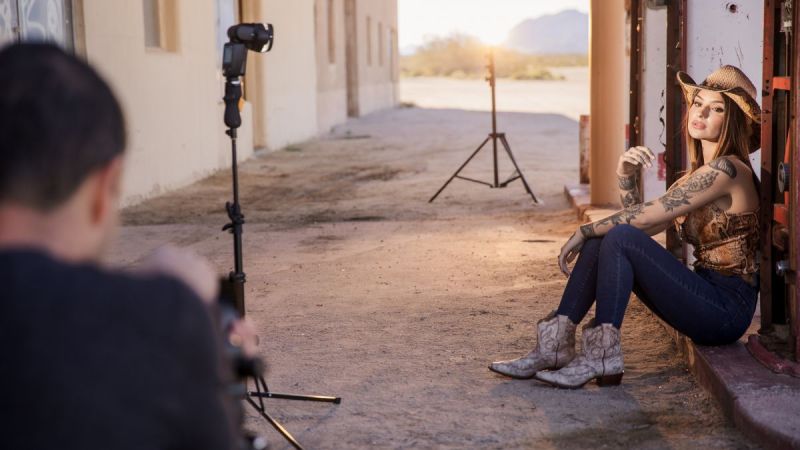
Improving your photography skills is a rewarding journey that demands both commitment and continuous learning. Whether you’re a natural behind the lens or not, dedication and perseverance can lead anyone to become a skilled photographer. This pursuit of excellence in photography is crucial at every stage, from beginner to professional. Constantly seeking ways to enhance your craft ensures that you keep growing, avoiding stagnation, and pushing your creative boundaries. To guide you along this path, here are some essential practices and tips designed to improve photography skills, no matter where you find yourself in this artistic journey.
Improve Photography by Understanding Common Mistakes
One of the first steps to improving your photography is to understand common mistakes so that you can avoid them in your own work. Here are a few common ones to keep in mind.
Not Picking a Singular Subject or Focus
Most images that we capture suffer from overload, the same way that we are in constant overload in our lives. The first step to improve photography is to simplify. Simplifying down to a single subject will help viewers focus on the image’s intended message.

This does not necessarily mean photographing only one person at a time, but rather focusing on one element within the frame and building the composition around that element, be it a single model, a couple, or a family.
Not Slowing Down and Finding a Unique Perspective
After deciding on your subject matter, put the camera down and take a moment to walk around and explore the scene. A standard compositional go-to like the rule of thirds works well, but it is — as mentioned — standard.

You can usually find more interesting compositions by simply moving around the scene, using foreground elements if possible, and finding lines and geometric shapes to lead and frame your subject.
Not Waiting For Moments to Happen

You’ve selected your subject and found your composition, but it’s not quite time to push the shutter button yet. Now, cue the action and wait for the moment. Remember, no matter how great the light or the composition, a bad expression can diminish the value or impact of an image, even to the point of making it undeliverable. Patience is key, and more often than not, it pays to wait for the moment to unfold.
Improve Photography with Education

Continuous education is crucial for advancing in photography, as it’s a field that’s constantly evolving with new techniques, technologies, and styles. Engaging in ongoing learning not only helps photographers keep up with the latest trends and equipment, but it also fosters creativity and inspiration. Whether it’s through workshops, online courses, reading photography books, or simply experimenting with different styles and methods, continuous education broadens a photographer’s skill set and understanding of the art. Moreover, it encourages a mindset of growth and adaptability, which is essential in a creative field where no two projects are the same. This commitment to learning ensures that photographers can continually refine their craft, produce more compelling images, and stay relevant in a competitive industry.
Improve Photography with Practice
 As any good teacher will tell you, education alone is not enough. As the saying goes “practice makes perfect.”
As any good teacher will tell you, education alone is not enough. As the saying goes “practice makes perfect.”
Practice is a cornerstone of improvement in photography, much like in any artistic endeavor. Regular practice not only refines your technical skills but also enhances your creative eye. It’s essential to step out of your comfort zone and experiment with new techniques, subjects, and compositions. Conducting test shoots is a fantastic way to explore these aspects without the pressure of a formal setting. It allows you to learn from mistakes, understand your equipment better, and discover your unique style. Don’t shy away from trying different lighting conditions, angles, or even genres of photography. Each experiment is a learning opportunity and a step towards becoming a more versatile and skilled photographer. Remember, every great photographer once started with the basics and grew through consistent practice and experimentation. So, grab your camera and start shooting, because every click brings you closer to the photographer you aspire to be.
Improve Photography with Constructive Critique
Constructive critique plays an invaluable role in the growth and development of a photographer. Receiving honest and constructive feedback from peers, mentors, or experienced photographers can provide insights and perspectives that you might overlook. It’s essential to approach critique with an open mind, recognizing it as an opportunity for learning and improvement, rather than as criticism of your skills.
Engage with photography communities, join clubs, or participate in online forums where you can share your work and get feedback. Actively seek out mentors who can offer guidance and challenge you to push your boundaries. Remember, a fresh set of eyes can reveal strengths to build upon and weaknesses to address, helping you refine your technique, composition, and overall approach. Embracing constructive critique is a stepping stone to elevating your photography to new heights and becoming a more thoughtful and skilled artist.
Improve Photography with Your Personality and Character
Much of your improvement in photography will come from your attitude and character. Here are 3 characteristics to work on to become a better photographer.
 1. Confidence
1. Confidence
First things first, staying humble is key to improving your photography. Remember, confidence is a double-edged sword. It can motivate you, but it can also hold you back if not kept in check. Differentiating between healthy confidence and overconfidence is often tricky. Too much confidence can lead to a sense of superiority and entitlement, while the right amount fosters contentment and satisfaction. Striking the right balance is crucial for you to continually fuel your passion for creation and achieve better results. Be cautious: when confidence edges into narcissism, it does more harm than good to your growth as a photographer.
2. Gratitude
Stay positive in all aspects of your life to enhance your photography skills. Embrace an attitude of gratitude and be thankful for every experience – that’s a great rule to follow to maintain a positive outlook.
Consider this philosophy, shared by a fellow photographer and inspired by the book and movie “The Secret”: always view the glass as half full rather than half empty. Even during challenging times, you have the power to control your mindset and stay positive. This approach doesn’t just improve your mood; it can attract positive outcomes and opportunities. While it may not always be easy to apply this philosophy, making an effort to live by it each day can lead to remarkable changes in your life. Embracing positivity can open doors you once only dreamed of, enriching both your personal life and your photography journey.
3. Sharing
Make an effort to surround yourself with positive influences to enhance your photography skills. It’s often said that you’re judged by the company you keep, so choose wisely. Being part of a supportive network, like a close-knit studio family where everyone helps each other grow, can be incredibly beneficial.
Here’s a strategy to consider: have three essential types of people in your life.
- Someone more experienced than you, who has achieved greater success. This person can be a mentor from whom you can learn and gain insights.
- A peer, someone at a similar stage in their photography journey. You can share and exchange ideas with this person, growing together.
- Someone less experienced than you, whom you can guide and mentor. Teaching others can reinforce your own knowledge and keep your passion alive.
Conclusion
In conclusion, improving your photography is a multifaceted journey that extends beyond mastering the technical aspects of your camera. It involves cultivating a mindset of continuous learning, staying humble and open to constructive criticism, embracing positivity, and surrounding yourself with a supportive network. Remember to balance practice with theory, and don’t be afraid to experiment and step out of your comfort zone. Whether it’s through finding inspiration from those more experienced, collaborating with peers, or mentoring others, each interaction is an opportunity for growth. By applying these essential tips, you are not just enhancing your skills, but also enriching your overall experience as a photographer. Keep shooting, keep learning, and most importantly, enjoy the process of capturing the world through your unique lens.





Get Connected!